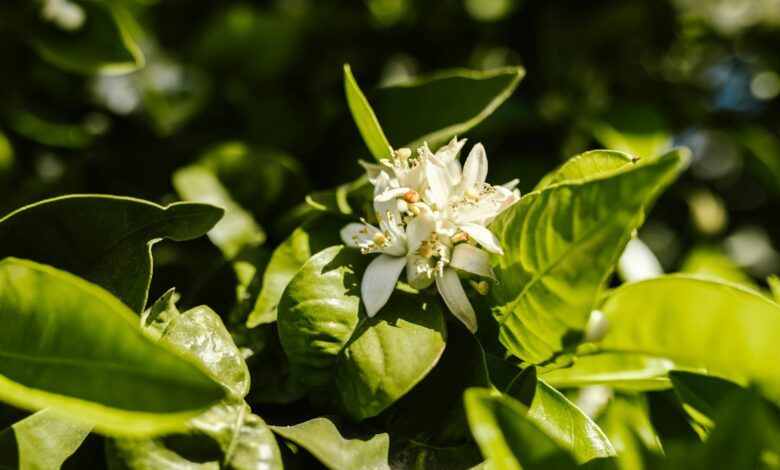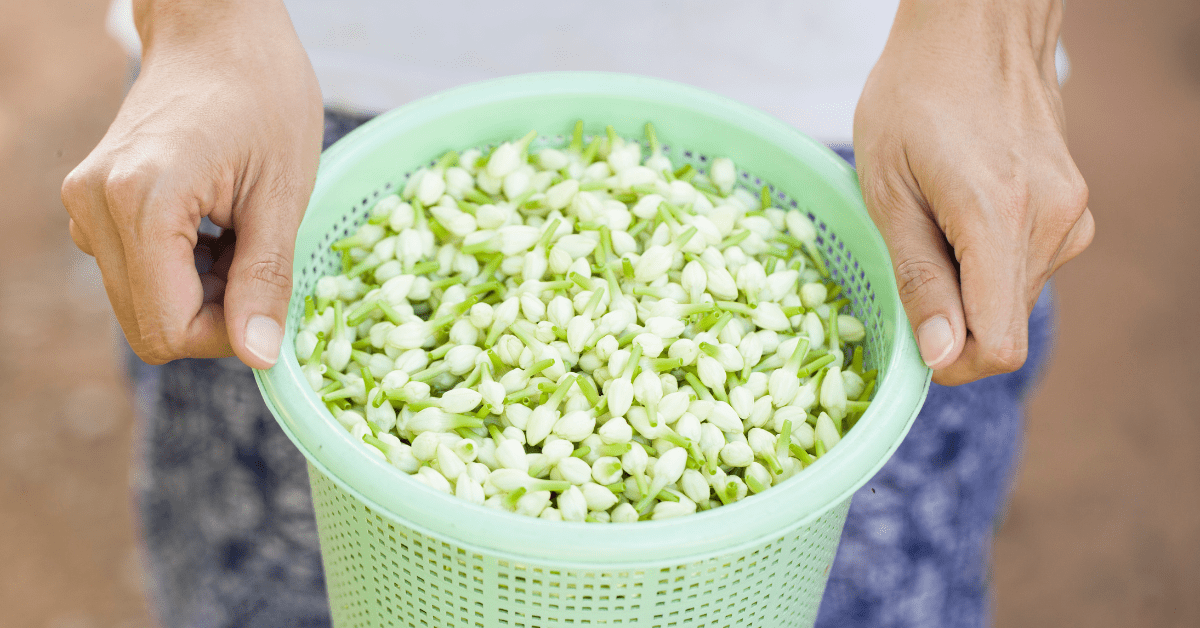Jasmine Farms Linked to Child Labour Supplying Estée Lauder and L’Oréal Products

A recent film by BBC World Service, named “Perfume’s Dark Secret”, has brought to light the widespread exploitation of child labor in Egyptian jasmine farms. These farms are major suppliers for renowned perfume companies like Estee Lauder and L’Oreal. The documentary delves into how inadequate auditing practices have failed to protect these child laborers, who number an estimated 160 million globally, according to a report by UNICEF. It is believed that the implementation of stricter due diligence laws could potentially make a difference in this issue.
In Al-Gharbia Governorate, located 120km from Cairo, the BBC discovered young children, some as young as five, collecting jasmine from 3am in four different areas. One of these locations is Shubra Beloula El-Sakhaweya, a small village that is responsible for producing 75% of Egypt’s jasmine and is featured in the article “Perfume’s Dark Secret”. Unfortunately, these children are suffering from injuries and allergies caused by pollen, which not only affects their academic performance, but also has long-term health consequences. The main culprits, as revealed by the investigative team, are large companies in the beauty industry who are accused of driving down the prices of jasmine and thus, indirectly, promoting child labour in their supply chains. Due to the low price of jasmine and the increasing inflation and devaluation of the Egyptian pound, parents feel pressured to involve their children in the harvesting process.
Since its introduction in the 1960s, jasmine farming has been a significant source of income for Shubra Beloula. According to a story published by BBC in February 2022, the entire village is involved in picking jasmine flowers during the six-month harvesting season from June to November. Mohamed Faraj, a picker, shared with BBC that everyone in the village, from the eldest to the youngest, participates in picking jasmine flowers. Even children as young as seven years old wake up early to pick flowers for a few hours before going to school. Faraj himself started picking jasmine at the age of nine.
Although the International Labour Organization’s (ILO) definition does not classify children working alongside their families in flower harvesting as forced labor, it still perpetuates the ongoing poverty cycle that impacts numerous individuals in the Global South. This type of child labor is widely recognized as one of the most severe forms of child labour.
Who regulates the cost of jasmine?
The jasmine trade in Egypt is valued at $6.5 million and provides employment for approximately 30,000 individuals. However, despite jasmine flowers being sold at EGP 45 (less than 1 dollar) per kilogram on the market, many pickers are living below the poverty line and earning less than $1 a day. The price is determined by factory owners at the start of the season and can vary depending on demand and the perfume market, but it remains consistently low. Due to an ongoing economic crisis, Egypt has experienced a significant increase in inflation and a 50% decrease in the value of the Egyptian pound against the US dollar since January 2022. Pickers have told the BBC that if the price of jasmine kept up with inflation, it would be valued at EGP 140 ($2.87 at the time of filming) per kilogram.
According to Ahmed Elshamy, a BBC investigative journalist who created a documentary, there have been ongoing complaints in the village regarding the consistently low prices. The factories continue to insist that they are offering the best price possible.
In the year 2020, the cost of perfume has significantly increased, as reported by CNN. Additionally, the perfume industry is projected to reach a value of nearly $70 billion by 2030, according to market research company Fortune Business Insights. However, suppliers are not experiencing any growth in profits, as the prices for the ingredients they provide have remained unchanged, as stated by the BBC. Surprisingly, the production cost for the liquid in a perfume bottle, which may be sold for $250, is only $1.50.
According to Elshamy, the rise in perfume prices following the pandemic should also result in an increase in natural oil prices and improve the lives of the pickers. However, there is limited proof of this happening in Egypt. Cox, the director of “Perfume’s Dark Secret,” explains that due to tight budgets, fragrance houses prioritize minimizing costs when sourcing raw materials for perfume production.
During July 2023, a team from BBC conducted an investigation in Al-Gharbia Governorate and examined various jasmine farms that cover an area of 720 acres of land. After conducting interviews with numerous families, landlords, workers, and managers of jasmine collection points, it was discovered that a significant number of jasmine pickers are actually children. The investigators also found evidence of children as young as five working in the jasmine fields between 3am and 8am, which is the ideal time for harvesting the flowers. In the documentary, Mirna El Helbawi, an Egyptian human rights activist and influencer, meets with a local family and reveals that a perfume made with Egyptian jasmine can cost up to EGP 10,000 ($205).
Picker Heba, who works in the jasmine fields with her 15, 10, and 5-year-old children to make ends meet, expresses her desire for those who use the perfume she helps produce to acknowledge the suffering of children involved in its production. She hopes that by speaking out, both the factory owners and their clients will become aware of the exploitation of children for the sake of making perfume and take action. This exploitation is unacceptable and must be stopped.
The investigation revolves around three main Egyptian companies, A Fakhry & Co, Machalico, and Hashem Brothers, which possess farms in Shubra Beloula. These companies are the primary suppliers for four major fragrance manufacturers, including Givauden, Symrise, Firmenich, and International Flavors and Fragrances Inc (IFF). These manufacturers produce perfumes for leading companies in the industry such as Estee Lauder and L’Oreal, who determine the budget for each perfume and ultimately influence pricing throughout the supply chain, resulting in the exploitation of child labour.
Also read: The Power of Justice: Exploring the Impact of Environment Lawsuits on Corporate Accountability
Child labour abuses are going undetected by audits

According to Eleanor Harry, the founder and chief executive of HACE, a company that utilizes data and AI to track child labour risks in supply chains, a large percentage of child labour, about 70%, is found in the agricultural sector and in lower tiers of supply chains. Out of the estimated 160 million child labourers globally, Harry notes that the majority are working within their families in informal jobs. The main reason for child labour is usually due to a gap between household income and expenses, with children often being relied upon to help fill this gap.
During their investigation, the BBC uncovered that children who are employed in jasmine picking often do not wear appropriate protective gear such as enclosed shoes, head torches, and clothing. As a result, they are prone to getting scratches and other injuries, as well as developing allergies on their skin and eyes due to excessive exposure to pollen and pesticides. According to A Fakhry & Co’s 2022 CSR report, around 80% of the jasmine they process is grown with the use of fertilizers and pesticides, some of which were identified as “dangerous and illegal”.
According to several independent studies, children are more susceptible to the negative effects of chemical exposure due to their ongoing brain and nervous system development. They are at risk of experiencing long-term and short-term health issues, including certain types of cancer, asthma, and organ damage, as well as neurodevelopmental problems, due to exposure to pesticides.
According to Harry, children’s academic achievement is negatively affected when they become tired from picking jasmine early in the morning and end up dozing off in school. This could also have long-term consequences on their physical, mental, and social growth, making them more susceptible to harm. Unfortunately, there is a lack of information about the potential risks and safety of adult workers who were once child labourers. This highlights the inadequate coverage and attention given to the issue of child labour.
The Child Law of Egypt, which was enacted in 1996, strictly forbids children under the age of 14 from engaging in any form of work. However, it does allow for children aged 12 to 14 to participate in seasonal agricultural work as long as it does not pose a threat to their health and development, and does not disrupt their studies. Moreover, the law explicitly states that it is against the law for children to work between the hours of 7pm and 7am.
The BBC’s investigations revealed that all corporations mentioned have publicly pledged to uphold human rights charters, such as the United Nations Global Compact. Some have implemented targeted measures to combat child labour, while others have incorporated child labour into their supplier codes of conduct. Nonetheless, these promises are not mandatory and often require the assistance of external auditing firms.
The BBC was provided with positive reports from Sedex regarding A Fakhry in May 2023. Sedex and the Union for Ethical Biotrade are two commonly used auditors by fragrance houses and factories in the investigation. The auditors announced their visit beforehand, conducted it during working hours, and only inspected the factory without visiting the jasmine farms. According to Harry, children are a reliable indicator of working conditions. However, it is challenging to prove their presence at the time of the audit if they are not present during that specific time.
Also read: The Shein Controversy: A Deep Dive into the Fashion Industry’s Ethical Practices
Ensuring Accountability with Due Diligence Laws

Jason Judd, the executive director of the Cornell University Global Labor Institute, argues that instead of scrutinizing the flaws and inadequacies of auditing systems, legal responsibility will play a vital role in eliminating child labour in supply chains. He questions, “Is it productive to hold auditors responsible for inaccurate information?” He believes that this is not a productive use of resources and attention. Instead, the focus should be on addressing the root issue – the lead company’s lack of accountability and consequences for failing to properly conduct due diligence.
The implementation of due diligence regulations, such as the 2017 French Corporate Duty of Vigilance Law and the proposed Corporate Sustainability Due Diligence Directive in 2022, holds conglomerates responsible for identifying and eliminating any instances of child labour within their supply chains. According to Judd, a change will not occur until we move away from self-regulation by leading companies, where they are able to establish their own guidelines, conduct their own investigations through audits or certifications, and report their own findings.
Estee Lauder has released a statement to Vogue Business expressing their commitment to safeguarding the rights of children. They have also reached out to their suppliers to thoroughly look into the “extremely grave issue”. The company acknowledges the complicated nature of the jasmine supply chain in Egypt and is actively striving for increased transparency.
According to L’Oreal, the company conducts frequent audits of its suppliers and found instances of child labour in its supply chains during the 2023 jasmine harvest, even before being contacted by the BBC. In an email, L’Oreal stated that it has collaborated with the Government of Egypt, the Fair Labor Association, and the International Labour Organization to implement measures for “promoting sustainable change in the communities.”
According to Givauden, a fragrance company, the concerns raised by the documentary are deeply concerning, and it is the responsibility of the entire supply chain to improve the lives of jasmine growers. Symrise stated that child labour goes against their principles and standards and International Flavors & Fragrances, Inc. has a zero tolerance policy towards it, enlisting a trusted third-party expert to review their supply chain. Firmenich has expressed their willingness to support joint efforts with industry partners and local jasmine farmers to address this issue, and they are even open to providing funding for such initiatives.
The allegations of child labor were denied by the Egyptian jasmine businesses. According to A Fakhry and Co., the practice is completely prohibited on their farm and factory. They also clarified that the claim about jasmine farmers and pickers earning below the poverty line is incorrect, as they are paid better than the standard wages for similar agricultural work in Egypt. Machalico stated that they do not employ any pickers under the age of 18 and that the pricing is discussed annually between factory owners, with an increase since 2022. Hashem Brothers declined to comment on the report, stating that it is based on false information.
Sedex, an auditing firm, has declared its strong stance against any type of labor rights violations and aims to assist companies in addressing such issues. According to a statement given to the BBC, the company stated that relying solely on one tool is not enough to uncover and rectify all potential environmental and human rights risks or impacts. In 2023, UEBT conducted field assessments in Egypt and issued a responsible sourcing attestation to one company. This attestation is subject to an action plan, which has been reviewed and approved by UEBT. If the action plan is not implemented by mid 2024, the attestation will be revoked.
According to experts and advocates, the latest evidence indicates that the initiatives taken by the fragrance industry so far are insufficient.
Judd suggests that the initial step for these companies should be to acknowledge the need to support public regulations that promote fair competition and hold all firms accountable for purchasing from suppliers with insufficient due diligence. He emphasizes that without this action, he will continue to report on these issues for the next two decades.




